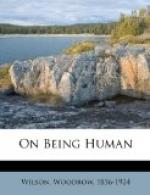Because the city curtails man of his wholeness, specializes him, quickens some powers, stunts others, gives him a sharp edge, and a temper like that of steel, makes him unfit for nothing so much as to sit still. Men have indeed written like human beings in the midst of great cities, but not often when they have shared the city’s characteristic life, its struggle for place and for gain. There are not many places that belong to a city’s life to which you can “invite your soul.” Its haste, its preoccupations, its anxieties, its rushing noise as of men driven, its ringing cries, distract you. It offers no quiet for reflection; it permits no retirement to any who share its life. It is a place of little tasks, of narrowed functions, of aggregate and not of individual strength. The great machine dominates its little parts, and its Society is as much of a machine as its business.
“This tract which the river of Time
Now flows through with us, is the plain.
Gone is the calm of its earlier shore.
Border’d by cities, and hoarse
With a thousand cries is its stream.
And we on its breasts, our minds
Are confused as the cries which we hear,
Changing and sot as the sights which we see.
“And we say that repose has fled
Forever the course of the river of Time
That cities will crowd to its edge
In a blacker, incessanter line;
That the din will be more on its banks,
Denser the trade on its stream,
Flatter the plain where it flows,
Fiercer the sun overhead,
That never will those on its breast
See an enobling sight,
Drink of the feeling of quiet again.
“But what was before us we know not,
And we know not what shall succeed.
“Haply, the river of Time—
As it grows, as the towns on its marge
Fling their wavering lights
On a wider, statelier stream—
May acquire, if not the calm
Of its early mountainous shore,
Yet a solemn peace of its own.
“And the width of the waters, the hush
Of the gray expanse where he floats,
Freshening its current and spotted with foam
As it draws to the Ocean, may strike
Peace to the soul of the man on its breast—
As the pale waste widens around him,
As the banks fade dinner away,
As the stars come out, and the night-wind
Brings up the stream
Murmurs and scents of the infinite sea.”




